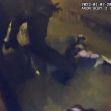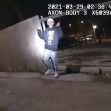The shooting death of 42-year-old Andrew Brown Jr. by police officers has rocked the town of Elizabeth City in North Carolina. As the details involving his death continue to emerge, Brown’s family and city residents are amplifying their cry for transparency. The family and community members continue to push for the release of the full police bodycam footage. According to reports, a judge could order a release of the footage as early as Wednesday.
This week has been a tumultuous one for the Brown family as they rallied around city hall steps with their team of lawyers, which includes civil rights attorney Benjamin Crump.
The demands of the family and the community include a call to action for the Pasquotank County sheriff's deputies to be transparent in what unfolded and a demand that body camera footage of the incident be released.
After a public back and forth between the family and the sheriff's department about the video, along with a delay in a family viewing of the video, family members were outraged when the footage they viewed privately was redacted. Lawyers for the family explain that they were able to view only 20 seconds of the video and that the footage was redacted to blur the faces of the deputies involved.
The City Manager Montré Freeman shared in a statement that he understood why the family is so frustrated after viewing a shortened video with redactions. Freeman shared with MSNBC, "I am completely flabbergasted at that move. You know, when you have bodycam, the most transparent thing to do is to show all of it, and unfortunately, that did not happen yesterday, and I wish I had an answer for you."
The sheriff’s office has explained that while city regulations require a judge to sign off on releasing the video to the public, the family members could view the video. However, an explanation has not been provided as to why the family viewed a shortened, redacted version.
Another attorney for the family, Bakari Sellers, explained on Tuesday, "The law does not require a judge's order to show the family the entire video." Sellers adds, "That was a discretionary decision made by the county to show them 20 seconds under the auspices of it being pertinent to them."
After the family viewed the video, they along with their lawyers expressed to the public that Brown did not pose a threat to officers. In an independent autopsy done on behalf of the family, findings show that Brown was shot five times, four in the arm and one fatal shot in the head. Lawyers have described the shooting as an “execution” conducted by deputies.
Sellers shared in a press statement, "We know that Andrew was shot in the back of the head. We know that that is at best against protocol, policy, and procedure and, at worst, it's illegal. We know he was shot a total of five times, four times in the arm, which is consistent with his arms being up and on the steering wheel."
Sellers emphasized, "We also know that at no time were [deputies] in any danger. There were no drugs found, and at no point did he try to use the car as a weapon."
As the community of Elizabeth City weighs in on the police shooting, so have critics who question how transparent the sheriff's department should be. The American Bar Association shared in a 2020 status report of Public Access to Body Cam Footage, “If communities are to respect the pronouncements of internal investigations bureaus, commanders, police chiefs, and mayors, the public must be able to “see for themselves” what actually transpired at the time in question.”
University of South Carolina criminal justice professor Geoffrey Alpert explains that while it might sound simple enough to release police officer body cam footage, it really depends on the jurisdiction as laws vary from state to state.
The quick response in Ohio’s decision to release bodycam footage hours after the police shooting of a sixteen-year-old as she attacked another teen while wielding a knife is a stark difference from the slow and uphill battle in Elizabeth City.
New York City and Los Angeles follow a similar approach where police can hold off on releasing footage up to 30 days and 45 days respectively. And even then, Los Angeles police can determine if the release of the footage would be in the best interest of the public.
Although regulations among the states vary, the demand for transparency is a common theme echoed in many of the fatal shootings of Black men by police officers. The demands for transparency have caught the attention of the federal government, with the FBI announcing that it has opened a Civil Rights investigation into the death of Andrew Brown.






